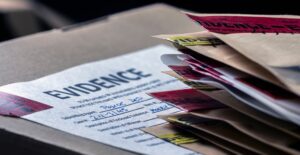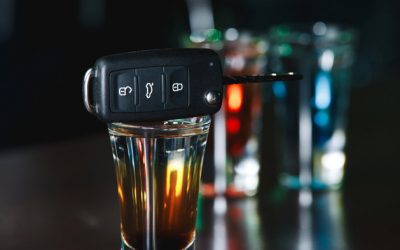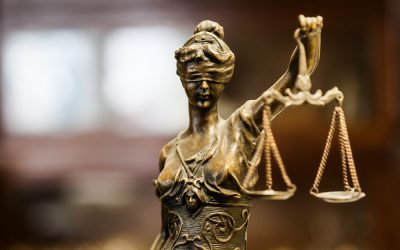
When the government charges you with a DUI, the prosecutor must prove that you were driving your car under the influence of alcohol beyond a reasonable doubt. To prove their case, the prosecutor must present evidence to the judge or jury. The strength of the evidence against you is very important, as it will determine whether you are convicted or not.
When you are facing charges for DUI, you need the help of a skilled Los Angeles DUI attorney.
What Is Circumstantial Evidence?
If you have ever watched a legal show on television, you have probably heard someone call evidence “circumstantial” to say that the evidence is weak. However, this is not accurate, and circumstantial evidence can indeed be very strong.
Circumstantial evidence is any evidence of any fact that the jury can use to infer the existence of another fact. A very common example of circumstantial evidence is a defendant being seen running away from the scene of a crime immediately after it happened. That evidence would not, in itself, prove that the defendant committed the crime, but a reasonable person might infer that they committed the crime if they ran away from the scene.
What Types of Circumstantial Evidence Are Used in DUI Cases?
In DUI cases, almost any evidence against you that is not a breathalyzer test is circumstantial evidence. The most common types of circumstantial evidence in DUI cases are:
- You were driving erratically;
- You smelled like alcohol;
- You were speaking with slurred speech;
- You were having trouble balancing;
- There were open containers of alcohol in your car.
In most situations, unless the police officer who arrested you did something wrong, the officer’s observations that you were exhibiting drunken behavior could be enough to convict you of DUI, even without a breathalyzer test.
What Other Types of Evidence Are There in DUI Cases?
In DUI cases, there are three main types of evidence. Circumstantial evidence can be very strong, but it is the weakest of the three types of evidence. The other, stronger types of evidence are known as direct evidence and prima facie evidence.
Direct Evidence
Direct evidence is evidence that proves or disproves a fact without requiring the jury to make an inference. The most common example of direct evidence in DUI cases is a police officer’s testimony that you were drunk. If the jury believes the police officer’s testimony, then that testimony is sufficient to prove that you were drunk beyond a reasonable doubt.
Prima Facie Evidence
Prima facie evidence is evidence that is sufficient to prove DUI beyond a reasonable doubt unless you disprove the evidence. This is a rare type of evidence that puts the burden on YOU to prove your innocence rather than on the prosecutor to prove your guilt.
There is really only one type of prima facie evidence in DUI cases: the breathalyzer. In California, if you are given a breathalyzer test, and the test shows that your blood alcohol content is above 0.08%, this is prima facie evidence of DUI if you were driving a car. This means that the jury can convict you of DUI based only on the breathalyzer evidence.
Is There Any Type of Evidence that Is Not Allowed?
There are also several types of evidence that are inadmissible, which means that they are not allowed in court. There are three types of evidence that are most commonly excluded (not let into court).
Propensity Character Evidence
Character evidence is evidence of a person’s character traits. One type of character evidence that is not allowed is propensity character evidence. This is evidence that is offered to show that a person normally acts a certain way and therefore must have acted that way again.
For example, the prosecutor cannot call a witness who knows you to testify that you often drink and then drive. This would be propensity evidence because the prosecutor would be offering it to prove that you acted in accordance with this character trait on the day of the DUI.
Hearsay Evidence
Hearsay evidence is when a witness testifies about a different person’s statements made out of court in order to prove the truth of that statement. An example of this type of evidence is if the prosecutor called a witness to the stand who testified, “Johnny told me that he saw Chris driving drunk.” This evidence is hearsay because it is a different person’s statements that were not made in court that are offered to prove that Chris drove drunk.
It is important to remember that statements you make are not considered hearsay. This is why you should never talk to the police without a lawyer present because the police officer can testify about what you told them, and it is not hearsay.
Improperly Obtained Evidence
The final type of evidence that is inadmissible is evidence that was improperly obtained. This means that the police officer who got the evidence did it in a way that violated your rights.
In DUI cases, if any evidence is improperly obtained, it is almost always the defendant’s confession. When you are arrested for DUI and taken for questioning, the police must inform you of your rights not to talk to them and to have an attorney present. If they do not do this, then the confession was obtained in violation of your constitutional rights and cannot be used.
These warnings are known as Miranda warnings. If you have ever watched a police show on television, you have probably heard of these. If you have been arrested, and the police are going to question you, they must warn you that you have the right to remain silent and that you have the right to have an attorney with you.
How Can a Los Angeles DUI Lawyer Help Me?
If you have been arrested for DUI in Los Angeles, you need the assistance of a Los Angeles DUI attorney. Your DUI attorney can help you by being with you while being questioned by police or by arguing on your behalf to the Court to get illegal evidence excluded from your trial.
You have a Constitutional right to an attorney. If you have been arrested for DUI, contact an attorney before you do anything else.
Our team can investigate your accident, evaluate your losses, and pursue maximum compensation for the challenges you’ve faced. Contact us today to schedule a free, no-obligation consultation at a time that works for you.






